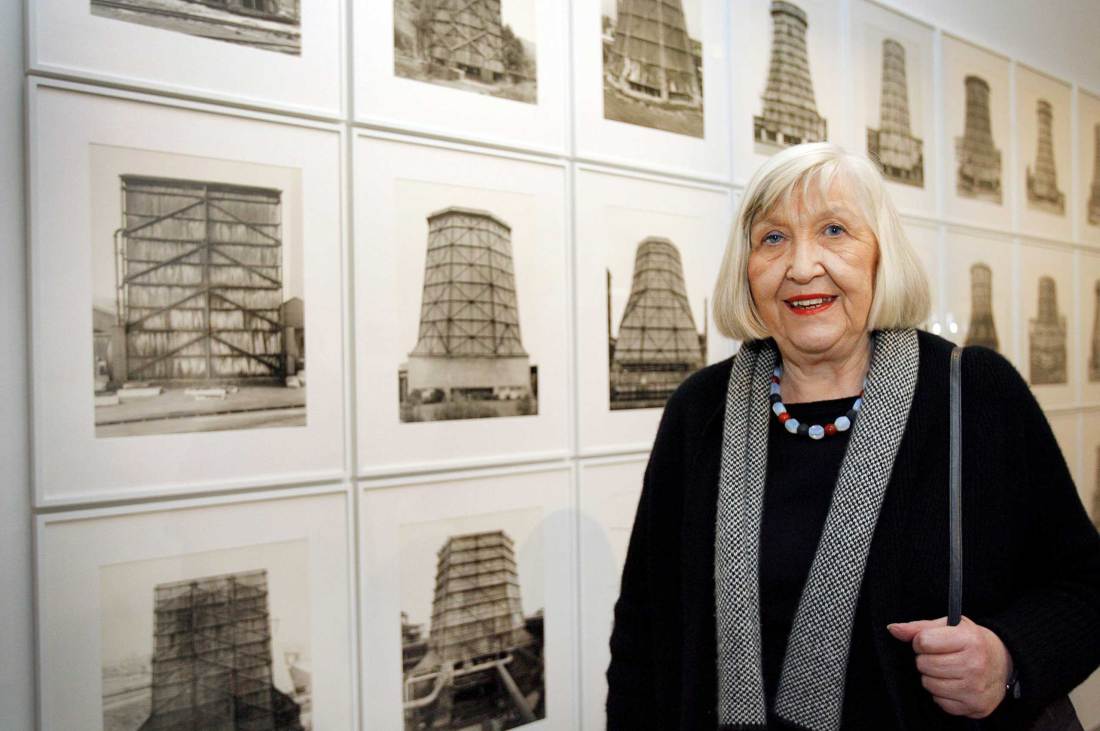
Bernd and Hilla Becher saw art in what most people would describe as banal or ugly. Eight years after the death of her husband in 2007, the influential German photographer Hilla Becher died in Düsseldorf on Saturday. She was 81.
The couple and artistic duo rose to prominence with their photographs of blast furnaces, water towers, silos, and other industrial structures throughout Europe and the US.
According to Der Standard, the pair met at the Kunstakademie Düsseldorf in 1959. While sharing a common interest in documenting the functional architecture of heavy industry, their mediums of choice differed.
Bernd Becher and Hilla Becher Pitheads (1974)
Photo: The artists via Tate, London
Prior to enrolling at art school, Hilla assisted the landscape photographer Walter Eichgrün, whereas Bernd experimented with etchings and lithography. Due to the limitations of accurately documenting architecture in drawings, the two students both turned to photography.
At art school, the couple explored Germany’s industrial heartland in the Ruhr valley documenting factories, mines, and metallurgical equipment.
They rose to prominence for their distinctive, stylistically uniform photography. They always used large-format cameras on black-and-white film, with the subject depicted centrally. They shot exclusively on cloudy days or in early morning light to avoid shadows. The compositions are almost always deserted.
Hilla Becher with her husband and collaborator Bernd Becher.
Photo: photo: Laurenz Berges via Goethe Institut
When shown in a gallery, the photographs were always arranged in a grid, a reference and contribution to minimalism and conceptual art.
“The collaboration with Bernd was always productive because we complemented each other very well,” Hilla later told Art Magazin.
In 1976 Bernd Becher was appointed Professor of photography at the Kunstakademie Düsseldorf, a position he held until 1996. (Hilla also taught there, but was not allowed to be a faculty member due to policy restrictions).
Bernd Becher and Hilla Becher Blast Furnaces (1980-88)
Photo: c4gallery.com
The so-called Becher School developed into one of the most influential art movements in Germany since Bauhaus. Several German contemporary photographers emerged from their teachings, including stars such as Andreas Gursky, Thomas Ruff, Thomas Struth and Candida Höfer.
The duo were awarded numerous distinctions and prizes including the Venice Biennial’s Golden Lion in 1990, the Erasmus Prize in 2002, and the Hasselblad Prize in 2004.
Following Bernd’s death in 2007, Hilla continued their work and legacy with the help of her assistant.
Accepting the Rhine Culture Prize last year, Hilla remarked with dry humor “It is clear that I only got the prize because I am left,” and greeted her husband Bernd, “wherever he may be, upstairs or downstairs.”